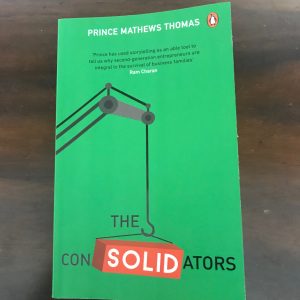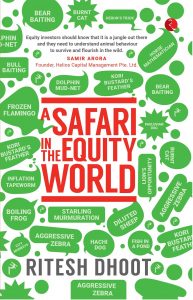The ever-elusive work-life balance for women is a universal issue, and many books explore the its dynamics. One of the most popular books on this theme, Lean In by Sheryl Sandberg, acknowledges not only the balancing act of parenting, but also the other challenges that women at the workplace have to face. The book obviously talks about the American context. However, when I read ISRO’s Magnificent Women and Their Flying Machines – India’s mission to Mars and the Moon by Minnie Vaid, I realised that some of the issues that Sheryl, the world-famous COO of Facebook talks about have been addressed by ISRO, a very forward-looking employer. The book explores backstories of women scientists working at India’s premier space research organization.
Both these books have impacted me in different ways, and surprisingly offered lessons that seem just right for the time I read them in. Good books do that- they match your frequency! When I read Lean In a few years back, I was starting my career as a writer, along with balancing the joys and travails of being a new mother. By the time I read ISRO’s Magnificent Women and Their Flying Machines, I was ready to give more time to my work, with a tween having less need for his mom! I have always been fascinated by how women balance work, home and kids, under really different circumstances. And, what makes it all worth it in the end?
What I wanted to look at specifically were the common as well as contrasting themes and threads that one can glean from these two books, that address the same issue but in different cultural contexts and at different points in time. My specific interest for the purpose of this story is to glean the ‘lessons’ and practical takeaways that play out in different ways across two very different cultures. And yet, there are some common points that bind us all together. Through the prism of the two books, I want to look at the proverbial work-life-home balance in an inspirational and uplifting manner.
The “family” support truth
Sandberg recommends to her readers that “We all need to encourage men to lean in to their families,”, acknowledging that in this quest for gender equality at the workplace, men need to play a crucial role as well, which is true. Except, if you apply her advice to the Indian context, we would probably need entire families (and family systems!) to “lean in” with the “working woman”. It is heartening to see that all the women scientists profiled in Vaid’s book, boasted of unflinching support from the family. Family support is crucial. It is not only practical help from the spouse and extended family (in terms of lending a hand with housekeeping and child care) but also in terms of the attitude of the family.

Sandberg also focuses a lot about company policies that are family-friendly in terms of paid leaves and so on. These are all great to implement at macro-level. In a sense Sandberg paints the picture of what a “perfect” organization should look like for all employees. But with the women scientists at ISRO, it’s more about a bold juggle and the typical Indian jugaad, with family cooperating at every step. This also includes one of the famous advantages that Indians have- additional help for housekeeping. As Anuradha TK, Programme Director, GEOSAT, URSC Bengaluru says in Vaid’s book, “I always say I run a factory at home, I have employed so many people! I don’t care how much money I spend on this. I am not here to make money or to be richer than others. I work here to give meaning to my life”.
Question of Pride
While Lean In gave plenty of guidelines and arguments for having inclusive workspaces, one of the aspects that clearly stood out for me, in “ISRO’s Magnificent women…” was the unflinching pride that all the women who worked here, had in their work. If the family shows pride in the fact that the women is working and striving towards excellence in their career, if the children and other members appreciate that and endorse that, if the overall atmosphere is encouraging, it really works in favour of women. The bold and brave ISRO women have ensured that their families not only stepped in for practical help, but took pride in their work. “I am proud of my mother. I want her to work, to promote women. I want India to be the best in space” says Aditya, son of Ritu Karidhal, Deputy Operations Director, MOM. This statement echoes the need to activate pride in what the woman does. All the children of the women scientists interviewed for the book expressed in very clear terms how proud they were of their mothers, and that their mothers were role models for them.
The women of ISRO are all proud to serve their country. Of course, they strive for their personal career goals, but the overarching feeling was of pride in their contribution to their country. What really stood out for me was the fact that they treated their ambitions seriously and their role as women in science was always about something bigger than themselves. As women in varied fields, how do we feel we can contribute to our society, our country and the world through our skills? For me, this was the X factor that I could lay my finger on! Am I really proud of the work I am doing and do I believe that it matters in the larger scheme of things?
Leap out!

“At a certain point, it’s your ability to learn quickly and contribute quickly that matters,” Sandberg writes. “Women need to shift from thinking ‘I’m not ready to do that’ to thinking ‘I want to do that — and I’ll learn by doing it.’” “Grab for leadership roles even if we are only 60 percent certain we have the credentials for that step — because, after all, that is what men do,” she advices. I take her point to mean that women need to arm themselves with confidence and really grab opportunities without a hint of self-doubt.
Even the men at ISRO, from the top leadership understand this. “We have made it much less hostile, but ultimately the playing has to be done by the player” Tapan Misra, Director, Space Application Centee, ISRO, Ahmedabad. This shows that while the playing field has been “levelled” to a large extent quite consciously, women need to grab the opportunity.
The bright women of ISRO understand this, and explain the same in what I think would be my mantra henceforth, as Nandini Harinath, Deputy Operations Director, MOM put it, using the analogy of its most famous mission-
“The Mars Orbiter Mission exited the earths sphere of influence to proceed towards its target orbit around Mars with a series of well-planned and executed manoeuvres. Similarly, for a woman to reach her destination she needs to exit the stereotypical sphere of influence around her and design her trajectory to make that giant leap”.
I do hope that there will be a day when ‘gender’ becomes irrelevant to ‘work’. Till then, we need books that inspire and encourage women to forge ahead in the career of their choice, reaching the stage they want to be at. I guess then that it’s Lean in to Leap out! Forget the glass ceiling…even the sky is not the limit.




